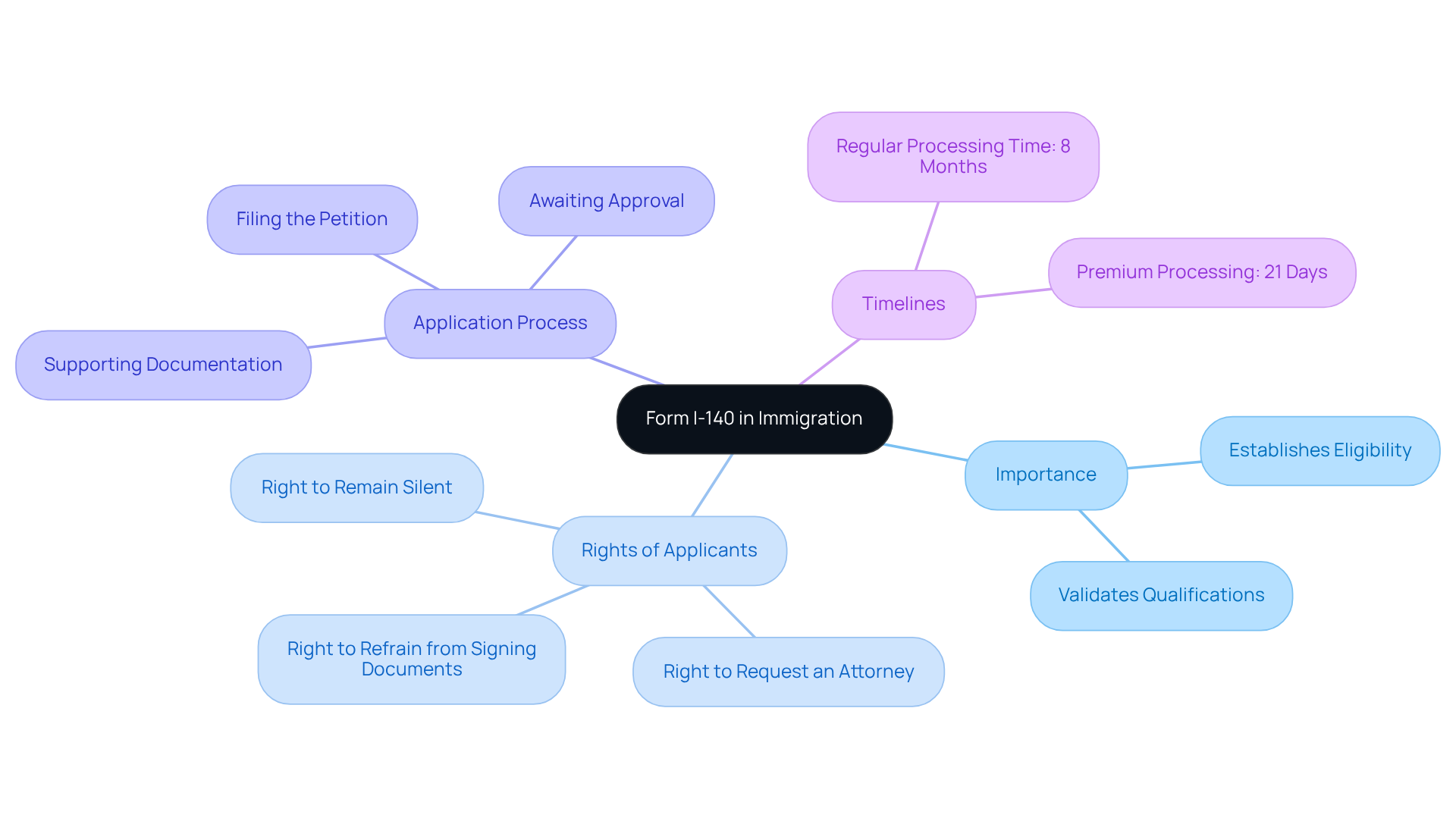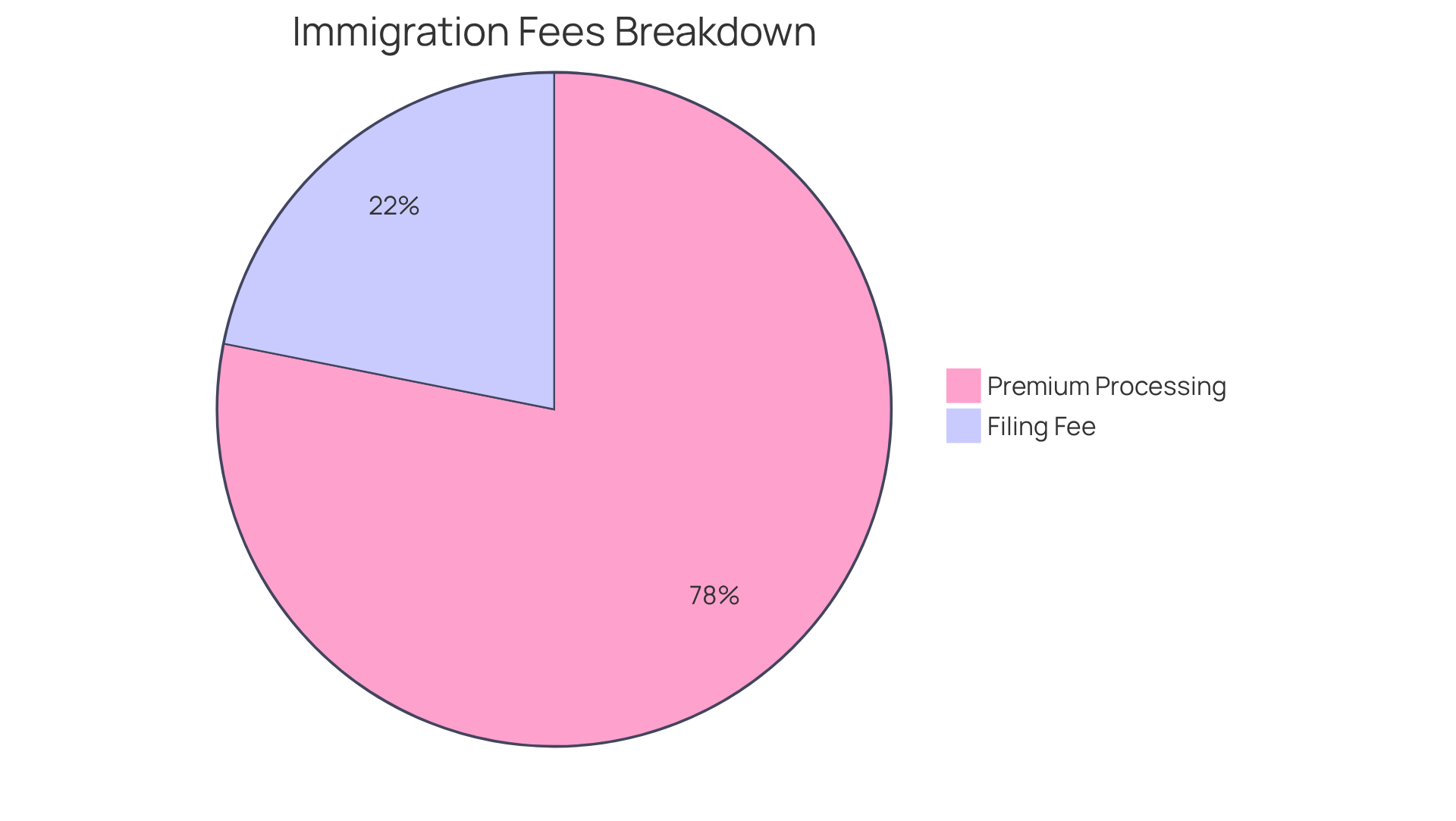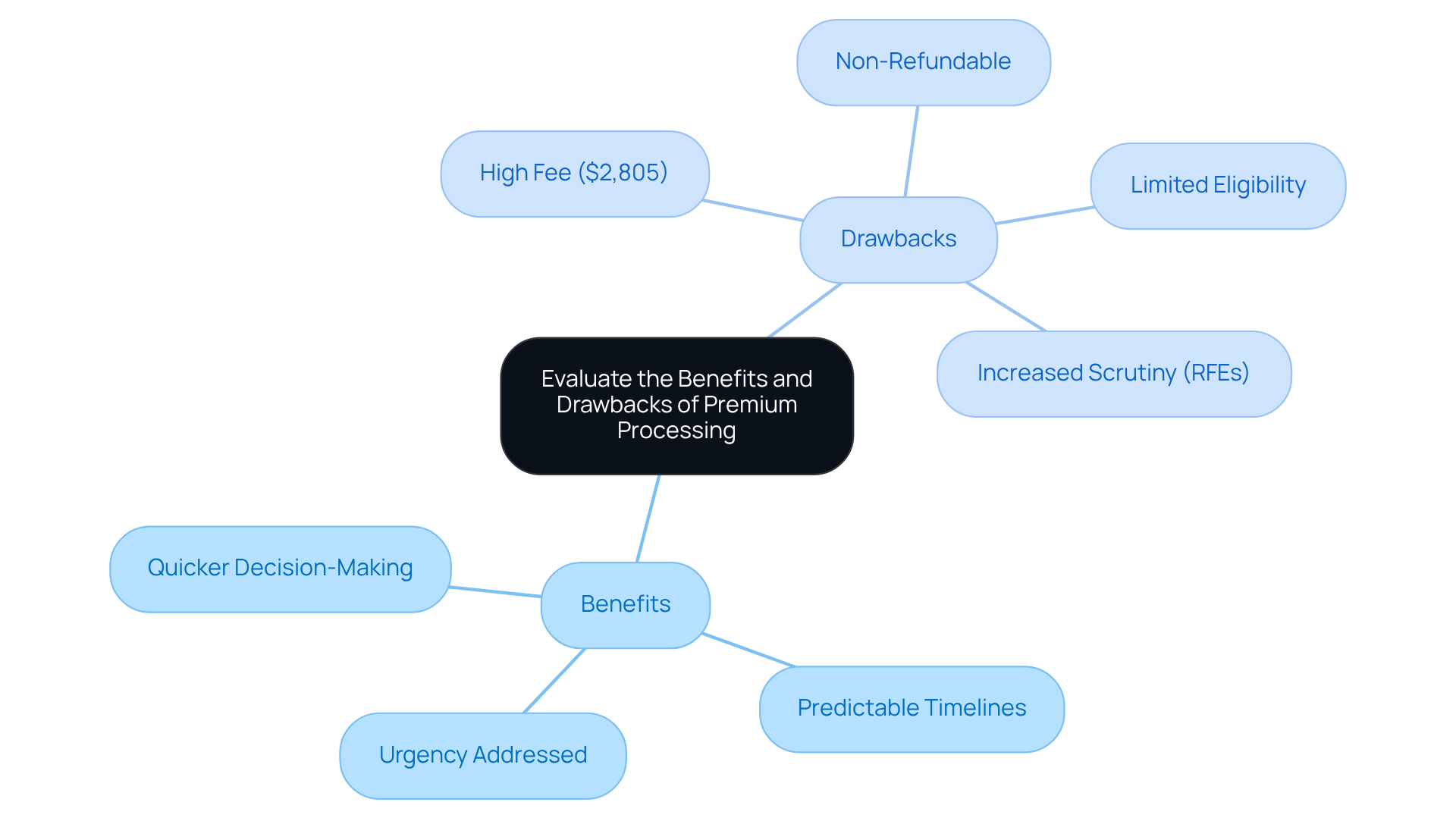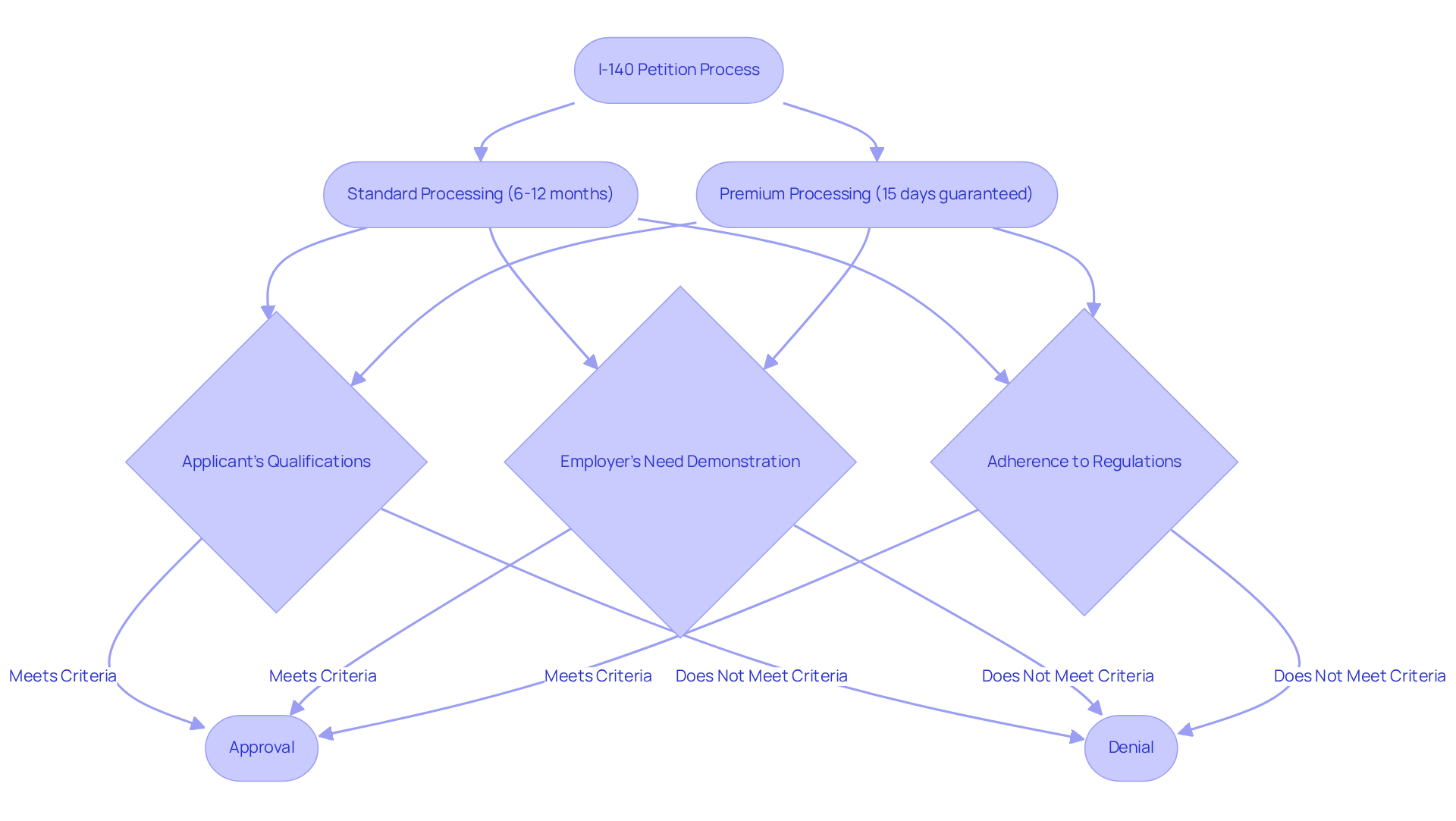Overview
The article sheds light on the implications of the I-140 premium processing fee for immigrants, outlining its costs, benefits, and potential drawbacks.
- Have you ever felt overwhelmed by the complexities of immigration processes?
- While premium processing offers expedited responses to applications, the hefty fee and the risk of increased scrutiny are significant factors that require careful thought.
- It’s crucial for applicants to weigh these considerations thoughtfully, knowing that we’re here to support you through this challenging journey.
Introduction
Navigating the complexities of U.S. immigration can feel overwhelming. Have you ever found yourself lost in the maze of paperwork? The critical Form I-140 serves as a gateway for many foreign workers seeking permanent residency, making it essential to understand the nuances of the I-140 premium processing fee. This fee can significantly alter the timeline and outcome of your immigration journey, providing a lifeline when time is of the essence.
But is the financial investment worth the potential benefits? Or do the risks and costs outweigh the advantages? This article delves into the key insights surrounding the I-140 premium processing fee, offering clarity on its implications for immigrants and their employers.
Remember, you’re not alone in this fight—we’re here to guide you every step of the way.
Clarify the Role of Form I-140 in Immigration
The Immigrant Petition for Alien Worker is a crucial part of the employment-based immigration process. When an employer files this form on behalf of a foreign worker, it validates that the worker has the for a specific job and that their skills are in demand within the U.S. This form is essential for obtaining an employment-based green card, as it establishes the worker's eligibility for permanent residency. Timely and accurate submission of the immigration application can significantly impact an immigrant's journey, as it is a requirement for both status adjustment and consular processing for a green card.
Have you ever felt lost in the immigration process? Statistics show that successful immigration petitions are vital for immigrant workers, directly influencing their ability to transition to permanent residency. Immigration attorneys emphasize the importance of understanding the application process; this knowledge can simplify your path to a green card and enhance your prospects in the U.S. job market. It’s also crucial for applicants to be aware of their rights during this process. In legal emergencies, remember:
- You have the right to remain silent
- You have the right to request an attorney
- You have the right to refrain from signing any documents without legal counsel
Understanding these rights can provide essential support while navigating the complexities of immigration.
Typical timeframes for immigration petitions hover around 8 months, but expedited options are available for certain categories, allowing for swift processing in just 21 days. Incorporating insights from legal experts can further underscore the significance of this form, reinforcing its pivotal role in the immigration process. We’re here to fight for your family and ensure you understand every step of the way.

Detail the Costs of I-140 and Premium Processing
The filing fee for Form I-130 is currently $700, payable at the time of submission. If you opt for expedited service, you will incur the I-140 premium processing fee of $2,500. The I-140 premium processing fee ensures that this premium handling speeds up the immigration application process, guaranteeing a response from USCIS within 15 calendar days. This can be especially crucial for employers and employees needing a swift resolution to their immigration status.
At Vasquez Law Firm, we recognize that these fees can weigh heavily on immigrant healthcare workers. That's why we offer flexible payment plans tailored to your financial situation, ensuring that financial constraints never prevent you from .
Remember, these fees can change, so it's wise to check the USCIS website for the most up-to-date information. Additionally, while employers may cover these costs, it’s essential to clarify this arrangement upfront to avoid any misunderstandings.

Evaluate the Benefits and Drawbacks of Premium Processing
While offers significant advantages, such as quicker decision-making for I-140 applications, it's vital to consider its drawbacks. The I-140 premium processing fee, currently set at $2,805, can be a hefty expense, particularly for immigrants and small businesses. This fee is non-refundable, meaning that if a request is denied, applicants bear the financial loss without recourse. Additionally, not all requests qualify for this expedited service, which limits its usefulness.
In real-world scenarios, the urgency to respond swiftly to USCIS decisions can lead to hasty documentation, raising the chances of Requests for Evidence (RFEs). In FY 2024, about 20% of EB-1 petitions received RFEs, and 15% were rejected, underscoring that paying for expedited service does not guarantee approval and highlights the risks associated with rapid handling. Although expedited service promises a reply within 15 days, unforeseen delays may still occur due to high demand or regulatory changes, complicating applicants' plans.
As Neonilla Orlinskaya points out, the value of expedited service depends on individual circumstances, including urgency, financial factors, and the strength of the case. Applicants must carefully weigh the benefits of speed and predictability against the substantial I-140 premium processing fee and the potential for increased scrutiny.
At Vasquez Law Firm, we understand that financial limitations can pose a significant challenge for many immigrant healthcare workers. That's why we operate on a contingency fee basis for personal injury cases—ensuring you pay nothing unless we win. For other legal matters, we provide flexible payment plans tailored to your financial situation, allowing you to pursue the legal representation you deserve without the burden of upfront costs. Our clients have direct access to experienced attorneys who are committed to understanding your unique case. Collaborating with our knowledgeable team can provide you with customized advice, helping you navigate the complexities of advanced procedures and make informed decisions that align with your immigration goals.

Examine Processing Times and Approval Rates for I-140
Processing durations for Form I can vary significantly, depending on the service center handling the request and the specific details involved. On average, standard procedures take between 6 to 12 months. However, the I-140 premium processing fee ensures a guaranteed response within just 15 days. Approval rates for I-140 petitions are generally favorable; many petitions receive approval when they are well-prepared and meet all eligibility criteria. Yet, it’s crucial to recognize that factors such as the , the employer's ability to demonstrate the need for the position, and adherence to immigration regulations can all impact the outcome. Staying informed about processing times and approval rates empowers immigrants to strategize their applications effectively. Remember, you’re not alone in this fight—we’re here to support you every step of the way.

Conclusion
Understanding the I-140 premium processing fee is crucial for immigrants navigating the complexities of the U.S. immigration system. This fee not only speeds up the decision-making process for employment-based green card applications but also underscores the vital role that Form I-140 plays in establishing eligibility for permanent residency. Recognizing its significance allows applicants to prepare effectively for the challenges ahead.
The article explores the costs associated with Form I-140 and the premium processing option, emphasizing the financial implications and potential risks involved. It outlines the benefits of expedited processing, such as quicker responses from USCIS, while also addressing the drawbacks, including the non-refundable nature of the premium fee and the possibility of increased scrutiny on applications. Moreover, it highlights the importance of thorough preparation to maximize approval chances.
Ultimately, the journey through the immigration process can feel overwhelming, but informed decisions can make a significant difference. Immigrants are encouraged to weigh their options carefully, considering both the urgency of their situation and the financial impact of premium processing. Engaging with knowledgeable legal professionals can provide tailored support, ensuring that every step aligns with their immigration goals. The right guidance can empower applicants to navigate this intricate landscape with confidence.
Frequently Asked Questions
What is Form I-140 and its role in immigration?
Form I-140, or the Immigrant Petition for Alien Worker, is a crucial part of the employment-based immigration process. It validates that a foreign worker has the necessary qualifications for a specific job and that their skills are in demand in the U.S. This form is essential for obtaining an employment-based green card.
Why is timely submission of the immigration application important?
Timely and accurate submission of the immigration application is vital as it significantly impacts an immigrant's journey. It is a requirement for both status adjustment and consular processing for a green card.
How do successful immigration petitions affect immigrant workers?
Successful immigration petitions are vital for immigrant workers as they directly influence their ability to transition to permanent residency.
What rights do applicants have during the immigration process?
Applicants have the following rights during the immigration process: the right to remain silent, the right to request an attorney, and the right to refrain from signing any documents without legal counsel.
What are the typical timeframes for immigration petitions?
Typical timeframes for immigration petitions are around 8 months. However, expedited options are available for certain categories, allowing for processing in as little as 21 days.
How can legal experts assist during the immigration process?
Incorporating insights from legal experts can underscore the significance of Form I-140 and provide support while navigating the complexities of immigration, ensuring applicants understand every step of the way.




